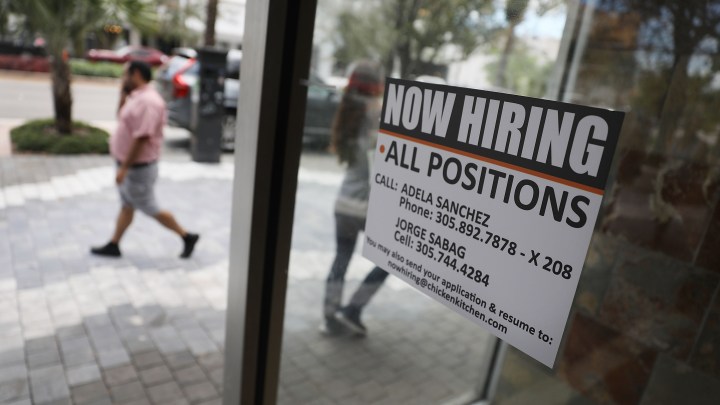
In labor crunch, businesses back efforts to clear workers’ criminal records
In labor crunch, businesses back efforts to clear workers’ criminal records

Joshua York, 29, got in trouble with the law when he became homeless as a teenager in Utah.
He racked up several minor charges, such as drug possession and retail theft. But even after York got his life together, those charges followed him with every job application.
“Every job has looked back at my record once they did a background check. And they would see a theft, and they would say, ‘I’m sorry, there’s just no way.’ It would literally take me out of the running immediately,” York said.
So, he made do with low-paying, manual labor work.
About two years ago, he found out that Utah allowed former offenders to apply to get their records cleared. He applied and received stacks of paperwork for each charge. With the help of a legal aid lawyer, he filled them out, and, three months ago, the charges were expunged.
York recently cleared a background check for a job with American Airlines and has a date to begin training next month.
“I’m in the best spot I’ve ever been in my entire adult life,” York said.
One in 3 American adults has a criminal record, whether for a minor misdemeanor, an arrest that led to no charge or a more serious felony crime.
And amid a labor shortage, with a historic quit rate among the American workforce, there is a growing effort to modernize and speed up the cumbersome record-clearing process. Advocates say few who qualify take advantage of the opportunity because, in many cases, they may not know about it or can’t afford the costs, such as hiring a lawyer to help.
Over the last two years, there has been a growing nationwide effort to pass “clean slate” laws, which call for updating court databases and creating algorithms to automatically clear records for minor criminal offenses. Legislatures in five states, including Utah and Pennsylvania, have passed such measures with bipartisan support.
Business groups are supporting the legislation too. The U.S. Chamber of Commerce has backed a similar idea at the federal level, framing the issue as one of “race and opportunity.”
“Black and brown people specifically … are the ones that have been paying for decades of overcriminalization … incarcerating people for failed initiatives, like the war on drugs,” said Sheena Meade, who heads the Clean Slate Initiative.
While businesses are eager to get a bigger talent pool, they are often reluctant to simply overlook a criminal record on background checks, said Jeffrey Korzenik, chief investment strategist at Fifth Third Bank and author of the recently published book “Untapped Talent,” which makes the case for hiring people with criminal records.
“The question for the business community becomes: What sort of risks are they taking from a legal standpoint? What kind of reputational risks are they taking? And, that’s where you have a huge social stigma to overcome,” Korzenik said.
Liability risks, however minor, are also a concern, he said.
Clearing people’s records through clean slate laws is something businesses can get behind because it relieves them of having to deal with those issues.
But implementation takes time — court databases need to be updated and computer code must be written.
Pennsylvania, which became the first state to enact a clean slate law in 2018, is the only one so far that automatically clears records, with the official count totaling more than 36 million cases.
“What the Pennsylvania Clean Slate act did, in starting a national trend, was to flip the burden,” said Rebecca Vallas, a senior fellow at the Century Foundation who helped create the clean slate model. “If you’re eligible to get your record cleared, you shouldn’t need to have a law degree or be able to hire someone who does to be able to get your record cleared and have a fair shot at moving on with your life.”
Utah is expected to begin automatic record clearing by the end of the year.
Noella Sudbury, who helped lead the drive to pass Utah’s clean slate law in 2019, has been helping to implement it.
“Right now, we have done the work to identify everybody eligible going back as far as court data goes,” Sudbury said, adding that preliminary estimates indicate 200,000 people will initially have at least some of their cases cleared.
There’s a lot happening in the world. Through it all, Marketplace is here for you.
You rely on Marketplace to break down the world’s events and tell you how it affects you in a fact-based, approachable way. We rely on your financial support to keep making that possible.
Your donation today powers the independent journalism that you rely on. For just $5/month, you can help sustain Marketplace so we can keep reporting on the things that matter to you.











